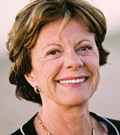Take for instance copyright
 Speech Neelie Kroes, EU-Commissaris Digitale Agenda, Avignon, 5 november: A digital world of opportunities
Speech Neelie Kroes, EU-Commissaris Digitale Agenda, Avignon, 5 november: A digital world of opportunities
"Today our fragmented copyright system is ill-adapted to the real essence of art, which has no frontiers. Instead, that system has ended up giving a more prominent role to intermediaries than to artists. It irritates the public who often cannot access what artists want to offer and leaves a vacuum which is served by illegal content, depriving the artists of their well deserved remuneration. And copyright enforcement is often entangled in sensitive questions about privacy, data protection or even net neutrality."
"(…) I believe that those who will prosper in the digital age are those who understand that convergence is one of the keys. The convergence of media provides an incredible opportunity for the artists and creators of our times, and also for their public – you and me. Just like cinema did not kill theatre, nor did television kill radio. The internet won't kill any other media either. (…) I think that is a realistic vision. But for that, we need to have the right building blocks.
Take for instance copyright. For 200 years, it has proved a powerful way to remunerate our artists and to build our creative industries. But copyright is not an end in itself. Copyright exists to ensure that artists will continue to create. Yet we see more and more often that it is not respected. In some sectors, the levels of piracy demand that we ask ourselves what are we doing wrong. We must ensure that copyright serves as a building block, not a stumbling block.
Look at the situation of those trying to digitise cultural works. Europeana, the online portal of libraries, museums and archives in Europe, is one key example. What a digital wonder this is: a single access point for cultural treasures that would otherwise be difficult to access, hidden or even forgotten.
Will this 12 million-strong collection of books, pictures, maps, music pieces and videos stall because copyright gets in the way? I hope not. But when it comes to 20th century materials, even to digitise and publish orphan works and out-of-distribution works, we have a large problem indeed. (…) Time alone will not solve the problems that have emerged.
Today our fragmented copyright system is ill-adapted to the real essence of art, which has no frontiers. Instead, that system has ended up giving a more prominent role to intermediaries than to artists. It irritates the public who often cannot access what artists want to offer and leaves a vacuum which is served by illegal content, depriving the artists of their well deserved remuneration. And copyright enforcement is often entangled in sensitive questions about privacy, data protection or even net neutrality.
It may suit some vested interests to avoid a debate, or to frame the debate on copyright in moralistic terms that merely demonise millions of citizens. But that is not a sustainable approach. We need this debate because we need action to promote a legal digital Single Marketin Europe.
My position is that we must look beyond national and corporatist self-interest to establish a new approach to copyright. We want "une Europe des cultures" and for this we need a debate at European level.
The Commission will soon make legislative proposals on orphan works and on the transparency and governance of the collective management societies. We will examine again the problem of divergent national private copy levies. We will also look into multi-territorial and pan-European licensing. And we will not stop exploring ideas for as long as the system is not working.
Instead of a dysfunctional system based on a series of cultural Berlin walls, I want a return to sense. A system where there is scope to create new opportunities for artists and creators, and new business models that better fit the digital age. We want to help you seize the opportunities of this age.
In conclusion, let the debate continue. It will be fierce, there are indeed hurdles. But our job is to look past them in order to clear them.
Speaking for myself, I will remember artists and citizens with each step forward. My sight will remain firmly on 'une Europe des cultures'.
Artists cast light on our world; our job is to let the light shine in. "
Lees de gehele speech hier.





















































































